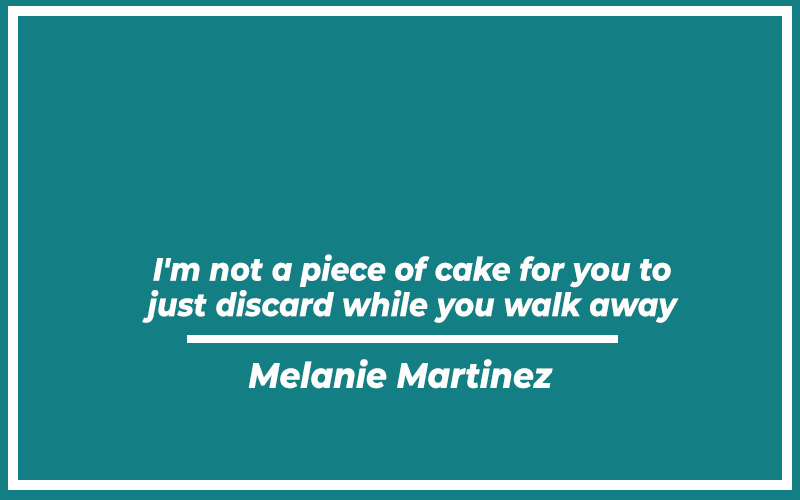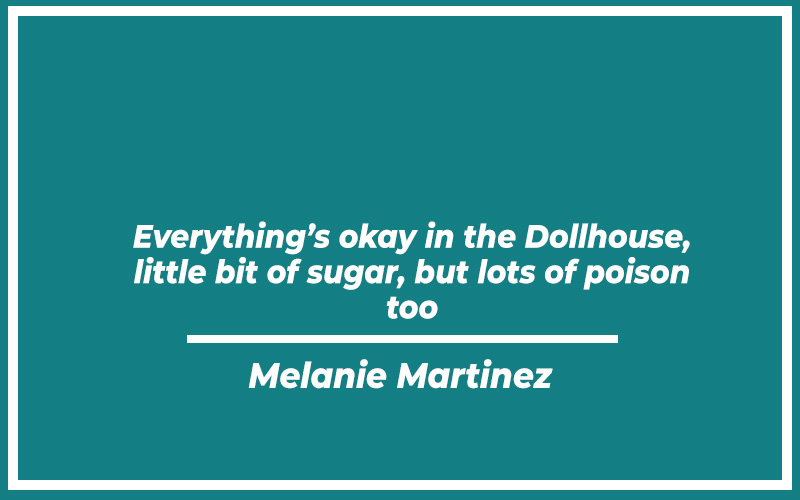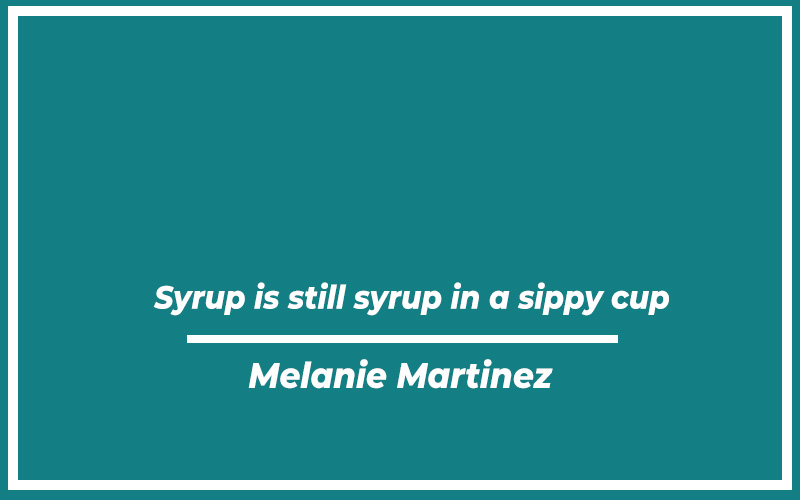When you dive into Melanie Martinez’s music, you’ll notice her lyrics are like vivid snapshots of raw emotions, tough realities, and unique perspectives.
Whether you’re already a fan or just discovering her, Melanie’s quotes will make you think and feel. Her words don’t just scratch the surface they explore themes like vulnerability, self-acceptance, and breaking free from societal norms.
You’ll find her blending innocent, childlike imagery with darker, mature ideas, making her lyrics resonate on a deeper level. These quotes highlight her ability to tackle real-life issues, making them perfect for reflection or inspiration.
Best Melanie Martinez Quotes

“I’m not a piece of cake for you to just discard while you walk away.” – Melanie Martinez
In “Cake,” Melanie compares herself to something easily consumed and discarded, reflecting a relationship where she feels used and undervalued. The metaphor expresses her frustration with being treated as disposable, reinforcing themes of self-worth and setting personal boundaries.
The quote is a powerful stand against allowing others to take advantage of you, reminding people they deserve respect. Melanie often explores complex emotional dynamics in her music, and here she portrays a relatable experience of feeling unappreciated but ultimately demanding respect.
Also Read: Mamma Mia Quotes (with Explanation)
“It’s my party, and I’ll cry if I want to.” – Melanie Martinez
This playful yet poignant line from “Pity Party” reinterprets an old song with a darker emotional twist. Melanie uses it to illustrate how she feels neglected and hurt, especially when people expect her to be happy. It underscores the message that individuals can express their sadness, even when the world expects them to be joyful.
The song embraces emotional freedom, encouraging people to own their feelings without apology. Through this quote, Melanie questions societal expectations of happiness and reminds us that we don’t always have to put on a brave face.
“Your skin is warm like an oven, your kiss is sugary sweet.” – Melanie Martinez
In “Mrs. Potato Head,” this quote mixes warmth and sweetness with a subtle underlying sadness. It evokes the comforting surface of love, but Melanie uses it to explore society’s obsession with appearances. The soft, tender language belies the darker themes of insecurity and superficial beauty that run throughout the song.
By pairing affection with these deeper issues, Melanie critiques how often love and attraction are tied to physical perfection. The lyric illustrates the pressure to maintain beauty while hinting at the emotional cost of living up to these standards.
“All the makeup in the world won’t make you less insecure.” – Melanie Martinez
This line from “Mrs. Potato Head” is a sharp critique of beauty culture and the cosmetic industry. Melanie points out that makeup, while it can change a person’s appearance, can’t fix underlying self-esteem issues. Her message emphasizes that self-worth cannot be found in superficial changes; it must come from within.
The quote speaks directly to the struggle of trying to mask insecurity through external means, a central theme in the song. By acknowledging this, Melanie encourages listeners to seek deeper solutions to self-acceptance beyond what society deems as beautiful.
“Blood still stains when the sheets are washed, sex don’t sleep when the lights are off.” – Melanie Martinez
In “Soap,” Melanie addresses the lingering emotional consequences of past actions through this haunting line. Using vivid imagery, she suggests that guilt and unresolved feelings remain long after mistakes are made. The mention of intimacy speaks to the complexity of relationships, where emotional baggage and unresolved issues often resurface despite attempts to move forward.
The quote hints at how deeply intertwined emotions and physical connections are, and how they often linger beneath the surface. It’s a reminder that some scars are not easily washed away, urging self-reflection.
“You seem to replace your brain with your heart.” – Melanie Martinez
This lyric from “Dollhouse” critiques how emotions can sometimes cloud judgment, especially in unhealthy relationships. Melanie observes how people often let feelings overpower logic, leading to destructive behavior. It speaks to the tension between emotion and reason, suggesting that too much focus on emotions can create false realities.
In her exploration of dysfunctional relationships, Melanie often highlights the dangers of ignoring one’s intuition or logic in favor of emotional satisfaction. This quote serves as a cautionary reminder to find a balance between heart and mind.
I’m peeling the skin off my face, ’cause I really hate being safe.” – Melanie Martinez
This lyric from “Mad Hatter” reflects a desire to break free from societal constraints and embrace one’s true self. The line speaks to Melanie’s broader theme of rejecting conformity and exploring the darker, more chaotic aspects of identity.
Peeling away the skin symbolizes stripping away protective layers that hide her authentic self. The quote captures a willingness to dive into uncomfortable emotions or thoughts to live more genuinely. Melanie often encourages listeners to embrace their uniqueness, even if it means stepping outside of their comfort zones or societal expectations.
“You don’t love her, stop lying with those words.” – Melanie Martinez
In “Pacify Her,” Melanie tackles the concept of false love and deception in relationships. This line is a direct call-out to someone pretending to be in love, forcing them to confront the truth. The lyric explores themes of jealousy, dishonesty, and manipulation, revealing the pain that comes from insincere affections.
Melanie’s directness encourages honesty in relationships and underscores how damaging it can be when people aren’t truthful about their emotions. The song taps into the darker aspects of love, and this quote challenges superficial expressions of affection.
“I’m not a little kid now, watch me get big now.” – Melanie Martinez
This line from “Sippy Cup” symbolizes personal growth and the frustration of being underestimated. Melanie uses it to highlight the transformation from childhood to adulthood, where old perceptions no longer apply. The lyric conveys the desire to be taken seriously and recognized for one’s evolution.
It encapsulates a theme of empowerment, as she asserts her strength and independence. Melanie’s music often reflects the complexities of growing up, and this quote captures the tension between holding onto childhood and embracing maturity, as well as the need for others to acknowledge that change.
“We paint white roses red, each shade from a different person’s head.” – Melanie Martinez
In “Mad Hatter,” Melanie Martinez uses this quote to symbolize conformity and the pressure to fit societal norms. The imagery of painting white roses red suggests the act of covering up one’s natural identity to please others. The mention of “a different person’s head” reflects how individual experiences and personalities are often suppressed or altered to match external expectations.
The lyric critiques how people, especially in youth, are often pushed to conform, even at the cost of their individuality. Melanie’s use of surreal imagery underscores the disturbing nature of this forced uniformity.
“If you weren’t born with it, you can buy a couple ornaments.” – Melanie Martinez
From “Mrs. Potato Head,” this quote critiques the beauty industry’s obsession with perfection and the pressure to alter one’s appearance. Melanie highlights how society encourages people, especially women, to fix their perceived flaws through artificial enhancements, symbolized by “ornaments.”
The line conveys the idea that natural beauty is no longer valued and that self-worth is tied to physical alterations. It speaks to the damaging effects of these unrealistic beauty standards, suggesting that true confidence cannot be bought. Melanie’s lyric serves as a commentary on the superficial solutions society offers for deeper emotional insecurities.
“D-O-L-L-H-O-U-S-E, I see things that nobody else sees.” – Melanie Martinez
In “Dollhouse,” this quote reflects the hidden dysfunction within seemingly perfect families. By spelling out “Dollhouse,” Melanie emphasizes the artificial, constructed nature of these appearances. The lyric suggests that beneath the surface, there are secrets and issues that others might not notice.
The “things that nobody else sees” alludes to the emotional or psychological struggles that are masked by outward perfection. Melanie’s music often explores the dark side of familial relationships and the pressures to maintain a flawless image, making this quote a commentary on the facade of perfectionism.
“You built a castle and now you’re sitting on the throne, but you built it on sand.” – Melanie Martinez
From “Soap,” this quote captures the fragility of success when it’s built on unstable foundations, whether in relationships or personal achievements. The “castle” symbolizes something grand and impressive, but the fact that it’s built on sand points to its inevitable collapse.
Melanie’s lyric suggests that if one’s accomplishments or relationships aren’t grounded in something genuine or strong, they will eventually fall apart. This imagery reinforces the importance of authenticity and solid foundations, serving as a warning against creating false realities that cannot sustain themselves over time.
You throw your tantrum, but it’s just a disguise.” – Melanie Martinez
This line from “Teddy Bear” speaks to the idea of emotional outbursts as a way to mask deeper insecurities or feelings of vulnerability. Melanie reveals that tantrums and aggressive behavior often hide the true emotions lurking beneath the surface. The quote highlights the theme of emotional manipulation, where outward displays of anger are used to control a situation.
Melanie frequently explores complex emotional dynamics, and here she encourages listeners to look beyond surface reactions and understand the root causes of someone’s behavior, pointing out that what we see isn’t always the full story.
“The kids are all wrong, the story’s all off.” – Melanie Martinez
From “Carousel,” this quote expresses disillusionment with societal expectations and the roles young people are forced into. The line reflects the confusion and frustration of growing up in a world where narratives often don’t match reality.
Melanie suggests that the stories we are told – about love, success, or happiness – are flawed or incomplete, leaving people feeling lost or misguided. The metaphor of being on a carousel reinforces the idea of being stuck in a cycle, constantly spinning but never getting anywhere, capturing the sense of futility many experience.
“Your favorite candy’s cotton, that’s why all your teeth are rotten.” – Melanie Martinez
In “Training Wheels,” this quote uses vivid imagery to critique the superficial pleasures that ultimately cause harm. Cotton candy, a symbol of sweetness and childhood joy, represents the fleeting and unhealthy things we often indulge in, while the “rotten teeth” symbolize the long-term damage caused by pursuing temporary happiness.
Melanie warns against the dangers of chasing instant gratification at the expense of one’s well-being. The lyric plays into her broader themes of innocence lost and the consequences of naive decisions, encouraging listeners to think more critically about their choices.
“You don’t know how to f***ing love me at all.” – Melanie Martinez
This bold statement from “Soap” lays bare the frustration of being in a relationship with someone who doesn’t understand or appreciate you. Melanie often writes about the complexities of love, and this line captures the raw emotion of feeling misunderstood or neglected.
The bluntness of the quote reflects a breaking point, where the speaker can no longer tolerate a partner’s lack of genuine care. It highlights the need for emotional intelligence and understanding in relationships, reminding listeners that love requires more than just affection—it needs depth and empathy.

“Everything’s okay in the Dollhouse, little bit of sugar, but lots of poison too.” – Melanie Martinez
In “Dollhouse,” this quote perfectly captures the tension between outward appearances and hidden dysfunction. The idea of “a little bit of sugar” suggests a veneer of sweetness and perfection, but “lots of poison” hints at the toxic reality underneath.
Melanie critiques the way families or relationships often present a perfect front to the world while hiding their true struggles. The line serves as a reminder that things aren’t always as they seem and that outward appearances can mask deeper, more troubling issues that need to be addressed.
“Hush, little baby, drink your spoiled milk.” – Melanie Martinez
This eerie line from “Tag, You’re It” uses twisted nursery rhyme imagery to convey a sense of danger and manipulation. The “spoiled milk” symbolizes something that was once nurturing but has now turned harmful, reflecting the song’s themes of innocence corrupted.
Melanie often juxtaposes childlike elements with darker themes, and this lyric exemplifies how she uses familiar symbols to explore the sinister aspects of life. The quote speaks to the loss of innocence and the painful lessons learned through betrayal, serving as a warning about trusting too easily.
“All the best people are crazy.” – Melanie Martinez
In “Mad Hatter,” Melanie celebrates individuality and eccentricity with this quote. By claiming that “all the best people are crazy,” she reframes mental health struggles and societal rejection as strengths rather than weaknesses. The line serves as a reminder that embracing one’s quirks and differences is more important than conforming to societal norms.
Melanie’s music often encourages listeners to embrace their true selves, even if it means being seen as “crazy” by others. This quote highlights the beauty in madness and celebrates those who defy conventional expectations in favor of authenticity.
I think I just remembered something, I think I left the faucet running.” – Melanie Martinez
This quote from “Soap” captures the feeling of regret and anxiety that comes from making a mistake and realizing it too late. The “faucet running” symbolizes unresolved emotions or issues that can’t be ignored, even if they were pushed aside.
Melanie’s use of everyday imagery to convey deeper emotional struggles is a hallmark of her songwriting. This line resonates with the idea that small, overlooked actions or decisions can lead to significant consequences. The lyric reflects the tension between avoidance and responsibility, encouraging listeners to confront their feelings head-on.
“Everyone thinks that we’re perfect, please don’t let them look through the curtains.” – Melanie Martinez
In “Dollhouse,” Melanie delves into the facade of perfection often portrayed by families or individuals. This quote highlights the pressure to maintain appearances and keep personal struggles hidden from the outside world.
“The curtains” represent the barrier between public perception and private reality, and Melanie suggests that people go to great lengths to conceal their flaws. The line speaks to the universal fear of being exposed, vulnerable, and judged. Through this lyric, she critiques the unrealistic expectations of perfection and the toll it takes on mental and emotional health.
“Your body is my temple, if it was a playground you’d be in trouble.” – Melanie Martinez
This powerful lyric from “Training Wheels” addresses respect in a romantic relationship. By referring to the body as a “temple,” Melanie emphasizes the sacredness and value of personal boundaries and autonomy. The playful threat about turning it into a “playground” speaks to the importance of taking relationships seriously and treating one’s partner with care and respect.
The quote reinforces the idea that love and intimacy are not games, but deeply meaningful connections that require trust and understanding. Melanie often explores themes of boundaries and respect in her work, making this a crucial message.
“I can’t breathe, I can’t be, I can’t be what you want me to be.” – Melanie Martinez
In “Mrs. Potato Head,” this quote reflects the suffocating pressure of trying to meet someone else’s expectations, particularly in terms of appearance or behavior. Melanie conveys the frustration of feeling trapped by others’ standards, whether societal or personal.
The repetition of “I can’t” emphasizes the emotional exhaustion that comes from constantly striving to be something you’re not. This lyric speaks to Melanie’s broader themes of self-acceptance and rejecting unrealistic beauty standards. It resonates with anyone who has struggled to break free from the constraints of others’ expectations.
“Why is it so hard to see? If I cut myself, I would bleed.” – Melanie Martinez
This line from “Cry Baby” explores the pain of feeling invisible or misunderstood. Melanie expresses the frustration of not being seen or acknowledged for who she truly is, even when her emotions are raw and visible.
The image of cutting oneself and bleeding is a powerful metaphor for how deeply the character feels, yet no one seems to notice. This lyric underscores the emotional disconnect between the character and those around her, reflecting themes of isolation and the need for validation. It’s a reminder that emotional pain is as real as physical wounds.
“I feel it coming out my throat, guess I better wash my mouth out with soap.” – Melanie Martinez
From “Soap,” this quote illustrates the feeling of regret after saying something hurtful or impulsive. Melanie uses the phrase “wash my mouth out with soap,” a classic punishment for bad language, to emphasize the guilt and self-reproach that comes with speaking thoughtlessly.
The lyric conveys the internal struggle between wanting to express oneself and dealing with the consequences of doing so. This speaks to a broader theme in Melanie’s music about the complexities of communication and the fine line between honesty and harm in relationships.

“Syrup is still syrup in a sippy cup.” – Melanie Martinez
This metaphor from “Sippy Cup” addresses the idea that masking problems with a superficial solution doesn’t change their underlying nature. Whether served in a “sippy cup” or another container, the syrup remains the same – symbolizing how people often try to disguise deeper issues with surface-level fixes.
Melanie critiques how society often glosses over or sugarcoats problems rather than addressing them directly. The line reflects her theme of exploring the darker side of human nature, encouraging listeners to confront uncomfortable truths instead of pretending they don’t exist.
Also Read: Britney Griner Quotes (with Explanations)
Final Thought
As you explore Melanie Martinez’s quotes, you’ll notice how she has a way of blending the whimsical with the deeply emotional, leaving you with powerful messages to reflect on. Her lyrics challenge you to embrace your true self, navigate complicated feelings, and reject society’s pressures.
Whether she’s addressing vulnerability, mental health, or the complexities of love, her words stick with you, offering both comfort and insight. If you connect with her music, you’ll find that her quotes resonate far beyond the songs, inspiring you to face your own struggles with honesty and strength.

